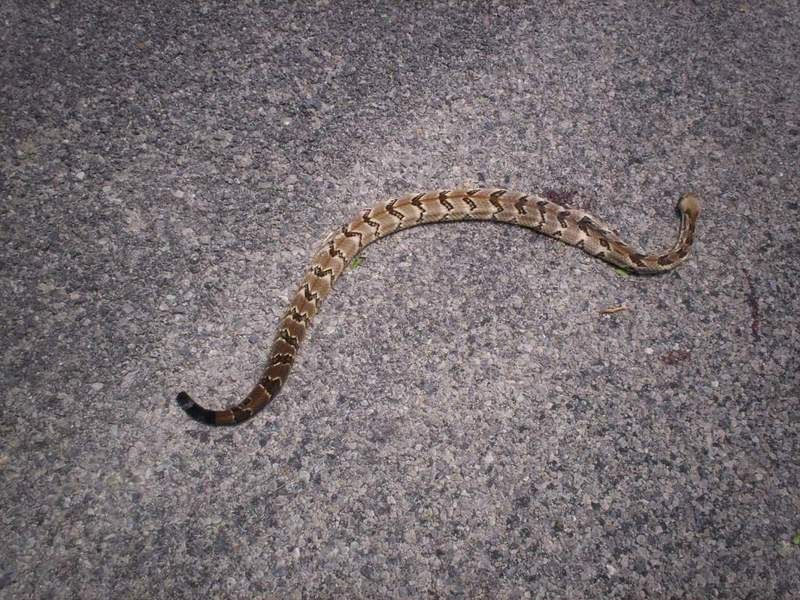
 |
Snake Bitten????
Who has ever been bitten by a snake, if so what kindand what all happend? Or if you know someone who has, let us know their experience. Also do any of you guys wear snake boots?
|
RE: Snake Bitten????
i do now, i was giuiding a quail hunt three years ago for a family friends ranch and got bit by a rattler. thank god it was a dry bite, the flew me out to the hospital in courpus christi and made sure i was ok. i have worn snake boots ever since. i was hit twice last year on the boot hunting on my roommatesland inMcCookTx. not in the same day but in the same month. scared the crap out of me. killed both of those rascles. they dont always rattlecontrary to belief.[&:]
|
RE: Snake Bitten????
I was bitten and it was painful, not venomous though, but still hurt like hell:D
From this other site...http://www.emedicinehealth.com/snakebite/page5_em.htm#Snakebite%20Treatment Take the following measures: [ul][*]Prevent a second bite or a second victim. Snakes can continue to bite and inject venom with successive bites until they run out of venom.[*]Identify or be able to describe the snake, but only if it can be done without significant risk for a second bite or a second victim.[*]Safely and rapidly transport the victim to an emergency medical facility unless the snake has positively been identified as harmless (nonvenomous). Remember, misidentification could be fatal. A bite without initial symptoms can still be dangerous or even fatal.[*]Provide emergency medical care within the limits of your training. [ul][*]Remove constricting items on the victim, such as rings or other jewelry, which could cut off blood flow if the bite area swells.[*]If you are in a remote area in which transport to an emergency medical facility will be prolonged, you should apply a splint to the affected limb. If you do apply a splint, remember to make sure the wound does not swell enough to make your splint a tourniquet, cutting off the blood flow. Check to make sure toes and fingers are still pink and warm, that the limb is not going numb, and that pain is not getting worse.[*]If you have been bitten by a dangerous elapid and have no major local wound effects, you may apply a pressure immobilizer. This technique is mainly used for Australian elapids or sea snakes. Wrap a bandage at the bite site and up the extremity with a pressure at which you would wrap a sprained ankle. Then immobilize the extremity with a splint, with the same precautions concerning limiting blood flow. This technique may help prevent life-threatening systemic effects of venom, but may also worsen local damage at the wound site if significant symptoms are present there.[*]While applying mechanical suction (such as with a Sawyer Extractor) has been recommended by many authorities in the past, it is highly unlikely that it will remove any significant amount of venom, and it is possible that suction could actually increase local tissue damage.[/ul] [*]The two guiding principles for care often conflict during evacuation from remote areas. [ul][*]First, the victim should get to an emergency care facility as quickly as possible because antivenom (medicine to counteract the poisonous effects of the snake’s venom) could be life-saving.[*]Second, the affected limb should be used as little as possible to delay absorption of the venom.[/ul][*]A number of old first aid techniques have fallen out of favor. Medical research supports the following warnings: [ul][*]Do NOT cut and suck. Cutting into the bite site can damage underlying organs, increase the risk of infection, and does not result in venom removal.[*]Do NOT use ice. Ice does not deactivate the venom and can cause frostbite.[*]Do NOT use electric shocks. The shocks are not effective and could cause burns or electrical problems to the heart.[*]Do NOT use alcohol. Alcohol may deaden the pain, but it also makes the local blood vessels bigger, which can increase venom absorption.[*]Do NOT use tourniquets or constriction bands. These have not been proven effective, may cause increased tissue damage, and could cost the victim a limb.[/ul] [/ul] |
RE: Snake Bitten????
I hunt in S.E. Oklahoma and during most hunting season we don't have problems with rattlers since they go under rocks during the cooler season.
However, one our friends who lives near our hunting properties was riding his 4 wheeler (during the summer) and was bitten by a rattler. Long story short, he fell off the 4 wheeler into a ditch and died. Sadly, his body was recovered a month later as where we hunt as well over a million acres of wooded land. Very sad deal, and I felt very sorry for his wife. |
RE: Snake Bitten????
I was bitten on the top of my foot as a kid by a non venomous snake.
2 years ago on opening weekend of turkey season here in TN, i was struck by a copperhead that I stepped on while trying to slip around a thicket to setup on a gobbler that I had comin' my way, my snake boots prevented the bite. |
RE: Snake Bitten????
I got hit by a baby cottonmouth when I was 14----1 fang on the little finger of my right hand. A week in the hospital, minus 1 finger, scars all over my right hand where the swelling busted my skin---I'm left handed now.(which is ok--I'm left eyed dominant anyway!)
Wear snake boots and DO NOT stick your hands into, under, over, or thru anything that you don't know what's on the other side. But that was 42 years ago and I"m sure that medical procedures have improved since then! |
RE: Snake Bitten????
A guy at our camp dropped a rifle shell out of his stand. When he got down to get it he got
bit by a copperhead on the finger. It was bad. Hospital, black finger, arm and hand so swollen he couldn't use it. He lost some movement and feeling in that finger. No, don't wear the boots, too uncomfortable. I'm more scared of ground hornets than snakes. |
RE: Snake Bitten????
Do NOT use ice. Ice does not deactivate the venom and can cause frostbite. |
RE: Snake Bitten????
Iknow a 14 yr.girl and a guy who were bitten byground rattlers(Pygmy). The girl was bitten 3 yrs ago trying to catch adeer dog. She was bitten on the hand, and here father told her it probably wasn't a snake,because it just look like a bee sting (she wasn't totally sure it was a snake).2 hrs later they are rushing her to the ER, trying to get anti-venom in her, while her arm was swelling up and turning black.The gut i know was moving firewood and the snakewas able to bite him twice, in the hand and the arm. He went directly to theER and sat in the hospital for 5 days. His hand and arm was so swollen and black it look like it was out of a comic book. Both lived with no damage
|
RE: Snake Bitten????
ORIGINAL: robbcayman I hunt in S.E. Oklahoma and during most hunting season we don't have problems with rattlers since they go under rocks during the cooler season. However, one our friends who lives near our hunting properties was riding his 4 wheeler (during the summer) and was bitten by a rattler. Long story short, he fell off the 4 wheeler into a ditch and died. Sadly, his body was recovered a month later as where we hunt as well over a million acres of wooded land. Very sad deal, and I felt very sorry for his wife.   |
| All times are GMT -8. The time now is 10:20 PM. |
Copyright © 2024 MH Sub I, LLC dba Internet Brands. All rights reserved. Use of this site indicates your consent to the Terms of Use.